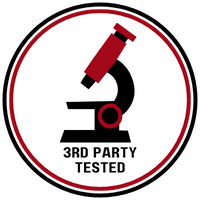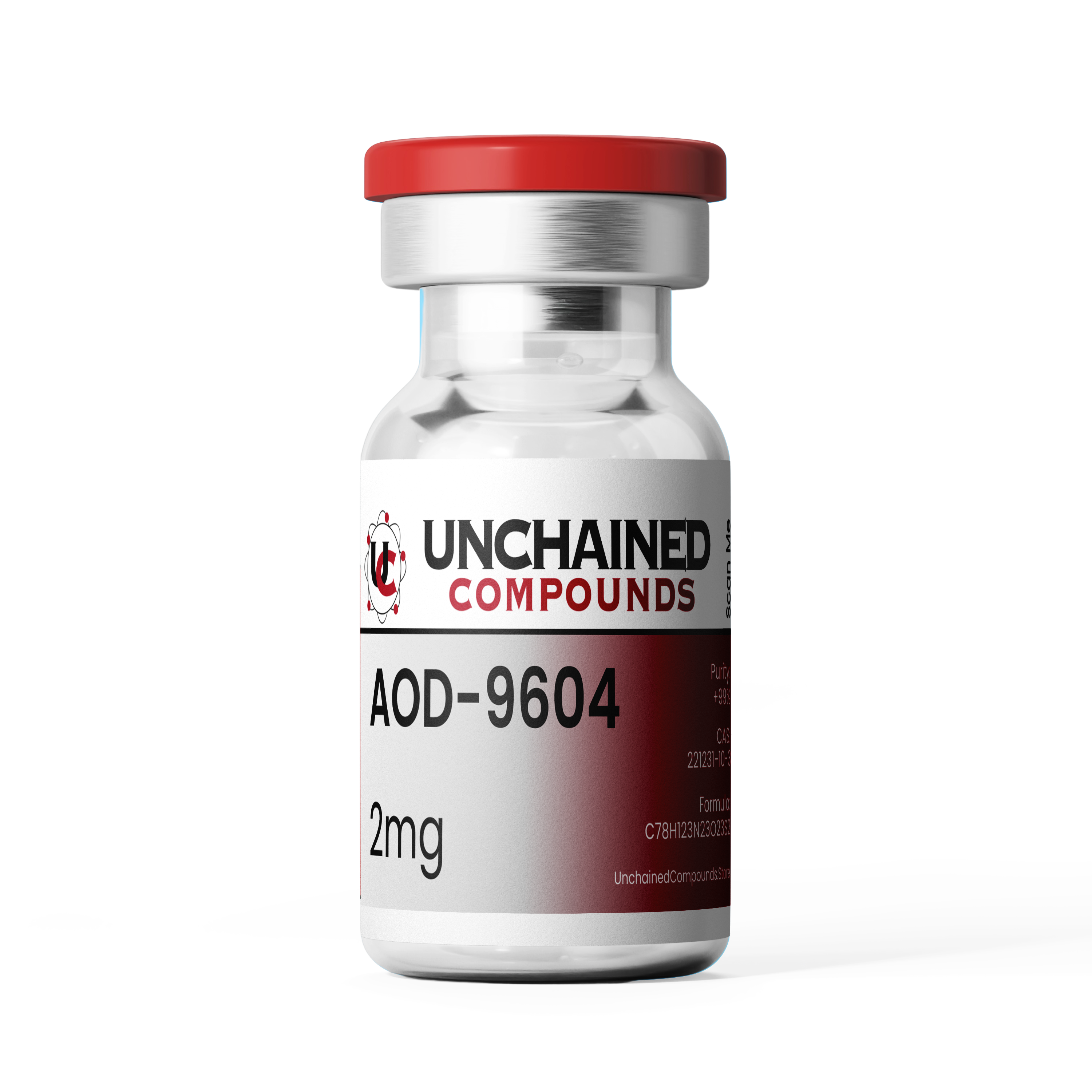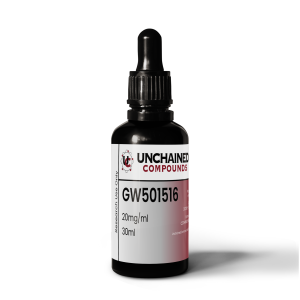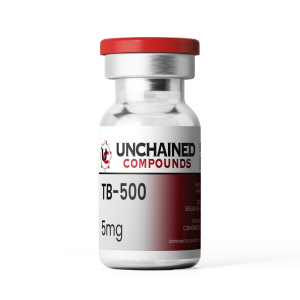Description







AOD9604 is a modified version of the hGH fragment 176-191 peptide (contains a di-sulfide bridge) and thus a derivative of human growth hormone (hGH). Originally developed as a lipolytic (fat burning) compound, AOD9604 has shown benefit in studies of heart disease, osteoarthritis/cartilage repair, and metabolic syndrome. AOD9604 stimulates lipolysis (the breakdown or destruction of fat) and inhibits lipogenesis in animal studies.
Specifications
- Chemical Formula: C78H123N23O23S2
- Molecular Mass: 1815.12g/mol
- Synonyms: AOD-9604; AOD 9604; AOD9604
- CAS Number: 221231-10-3
- PubChem: 16131447
- Total Amount of the Active Ingredient: 2 mg (1 vial)
- Shelf Life: 36 months
Peer-Reviewed Studies
Abstract
Objective: To observe the chronic effects of human growth hormone (hGH) and AOD9604 (a C-terminal fragment of hGH) on body weight, energy balance, and substrate oxidation rates in obese (ob/ob) and lean C57BL/6Jmice. In vitro assays were used to confirm whether the effects of AOD9604 are mediated through the hGH receptor, and if this peptide is capable of cell proliferation via the hGH receptor.
Method: Obese and lean mice were treated with hGH, AOD or saline for 14 days using mini-osmotic pumps. Body weight, caloric intake, resting energy expenditure, fat oxidation, glucose oxidation, and plasma glucose, insulin and glycerol were measured before and after treatment. BaF-BO3 cells transfected with the hGH receptor were used to measure in vitro 125I-hGH receptor binding and cell proliferation.
Results: Both hGH and AOD significantly reduced body weight gain in obese mice. This was associated with increased in vivo fat oxidation and increased plasma glycerol levels (an index of lipolysis). Unlike hGH, however, AOD9604 did not induce hyperglycaemia or reduce insulin secretion. AOD9604 does not compete for the hGH receptor and nor does it induce cell proliferation, unlike hGH.
Conclusions: Both hGH and its C-terminal fragment reduce body weight gain, increase fat oxidation, and stimulate lipolysis in obese mice, yet AOD9604 does not interact with the hGH receptor. Thus, the concept of hGH behaving as a pro-hormone is further confirmed. This data shows that fragments of hGH can act in a manner novel to traditional hGH-stimulated pathways.
Abstract
Both human GH (hGH) and a lipolytic fragment (AOD9604) synthesized from its C-terminus are capable of inducing weight loss and increasing lipolytic sensitivity following long-term treatment in mice. One mechanism by which this may occur is through an interaction with the beta-adrenergic pathway, particularly with the beta(3)-adrenergic receptors (beta(3)-AR). Here we describe how hGH and AOD9604 can reduce body weight and body fat in obese mice following 14 d of chronic ip administration. These results correlate with increases in the level of expression of beta(3)-AR RNA, the major lipolytic receptor found in fat cells. Importantly, both hGH and AOD9604 are capable of increasing the repressed levels of beta(3)-AR RNA in obese mice to levels comparable with those in lean mice. The importance of beta(3)-AR was verified when long-term treatment with hGH and AOD9604 in beta(3)-AR knock-out mice failed to produce the change in body weight and increase in lipolysis that was observed in wild-type control mice. However, in an acute experiment, AOD9604 was capable of increasing energy expenditure and fat oxidation in the beta(3)-AR knock-out mice. In conclusion, this study demonstrates that the lipolytic actions of both hGH and AOD9604 are not mediated directly through the beta(3)-AR although both compounds increase beta(3)-AR expression, which may subsequently contribute to enhanced lipolytic sensitivity.
Metabolic studies of a synthetic lipolytic domain (AOD9604) of human growth hormone
Abstract
A synthetic analogue (AOD9604) of the lipolytic domain of human growth hormone (hGH) has been studied for its metabolic actions in obese Zucker rats. Daily treatment with an oral dose of AOD9604 of 500 microg/kg body weight for 19 days reduced over 50% (15.8 +/- 0.6 vs. 35.6 +/- 0.8 g) body weight gain of the animals in comparison with the control. The adipose tissues of the AOD9604–treated animals were found to have an increase in lipolytic activity. In contrast to chronic treatment with intact hGH, chronic treatment with AOD9604 showed no adverse effect on insulin sensitivity of the animals, as demonstrated with euglycemic clamp techniques. The results in the present study suggest that the analogue of the hGH lipolytic domain may have the potential to be developed into an orally usable and safe therapeutic agent for obesity.
Disclaimer
The information provided above is not intended to substitute medical advice, diagnosis, or treatment. Should you have any questions regarding a medical condition, seek the advice of your physician or a qualified healthcare provider. In no case should medical advice be disregarded or delayed because of what you have read or seen. We bear no responsibility or liability for your use of any of our research compounds and products. Please note that they are being sold for research purposes ONLY. We do NOT condone any personal use.
NOTE: In some cases wherein the assigned top colors are out of stock, a different top color will be used to ensure that your order will not be delayed. Should you need assistance identifying the peptide vial that you received, please send us an email at support@unchainedcompounds.store.
ALL ARTICLES AND PRODUCT INFORMATION PROVIDED ON THIS WEBSITE ARE FOR INFORMATIONAL AND EDUCATIONAL PURPOSES ONLY.
The products offered on this website are intended for in-vitro studies only. In-vitro studies (Latin: “in glass”) are performed outside the body. These products are not medicines or drugs and have not been approved by the FDA to prevent, treat, or cure any medical condition, ailment, or disease. Bodily introduction of any kind into humans or animals is strictly forbidden by law.









